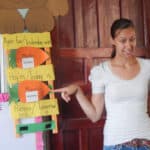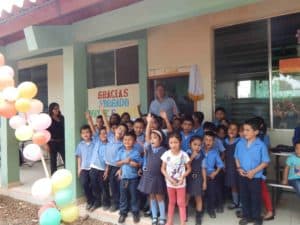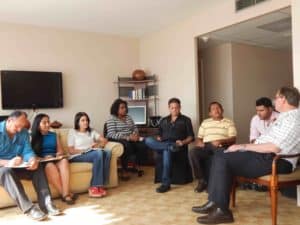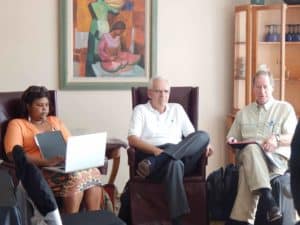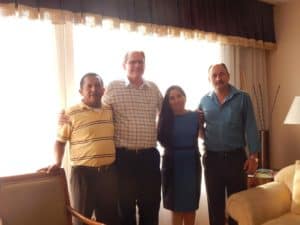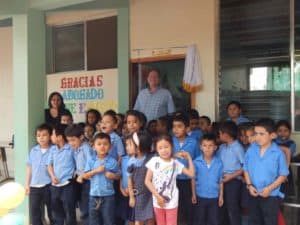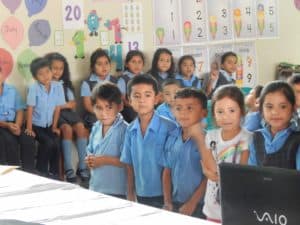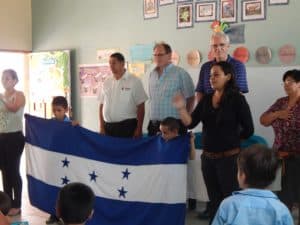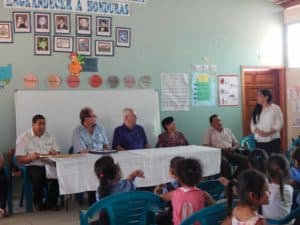His name is Valentino (yes just like the bygone, heart throb, movie idol). These days, he’s hanging out with the second graders at the Good Shepherd Bilingual School. He’s only six and the other children in the second grade classroom are seven or eight. But he’s tall for his age, his English is excellent, and so in many ways he fits right in. He’s energetic, very outgoing, and makes friends easily, both among his peers and adults. He’s at ease in this environment, even though it is not the one in which he was born and raised. He’s from Ohio and he’s only been in Honduras for three to four months. He gives pause to any adult looking on because he sticks out like a sore thumb. His fair hair and eyes, his Mohawk haircut, his height, and other subtle characteristics give him away as not from here. But he doesn’t know and doesn’t care. He likes it here. The other children flock around him. Perhaps we might want to think he has a magnetic personality. He does, I think, but the reason he attracts playmates and friends has little to do with his personality. He’s different, and as much as he wants to learn about them, they want to learn about him. Every day is a new adventure of discovery and fun.
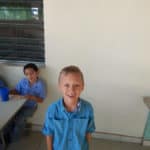
Children simply don’t have the inhibitions that adults suffer. Even though we think it natural to stiffen when confronted with the unfamiliar, it’s really simply learned behavior. A new language, a new environment and culture, new ways of thinking, feeling, and relating, are not really burdens or obstacles to be overcome, but rather opportunities for enrichment. Children know this innately, and we adults can learn a great deal in watching them. We’d probably have a lot fewer wars, and build a lot fewer walls, physically as well as in our minds and hearts, if only we would heed the lesson Valentino has to teach us. Fear is a learned response. It has its place. It can protect us. But it is not our natural response. Our natural response, our instinct if you will, is to connect. Something it seems that Valentino and his playmates at the Good Shepherd Bilingual School achieve with ease and grace.

Valentino’s background, his family influence, also has something to do with his disinhibition to be sure. His mother, Jessica Lynn Lemus-Donahue, has been volunteering at our bilingual school since March. She met her husband, Edman, originally from Camasca, Intibucá many years ago in Ohio and were married in 2011. They brought Valentino into the world, followed by Penelope, now age 2.” Jessica had been working, and continues to work part-time via the internet, as a paralegal dealing with immigration law. That is where she learned her flawless Spanish. She told us that she had never been to a Latin American country except for one visit in which she brought the two-year old Valentino to visit her mother-in-law in Honduras. It’s a little difficult for me to believe this as she seems to fit in so seamlessly here. Just like her son, the children at the bilingual school flock around her. They usually try to speak Spanish with her, but she gently responds in English, and solicits them kindly to converse in English. She’s been a great asset to the school, mostly with our kindergarten class where she spends most of her time. She has that rare gift found among teachers of excellent quality. Her approving smile is always present, never judging or critical, but always calling forth the best from her students. She initiated a behavioral, color-coded chart for each student. On the day we visited the kindergarten class, each child presented her with their chart. She told them their color for the day. Most got green, meaning their behavior was excellent. With pride they colored in their day, readied to take them home, show their parents, get their signature, and bring them back on the next school day.
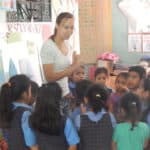
We were so impressed with the children’s acceptance of Jessica, and Jessica’s acceptance of them. For Valentino, it seems the apple has not fallen so far from the tree. After class, we enjoyed a brief lunch with Jessica. The family’s trip to Honduras, and their stay with relatives in Camasca, is in order for Edman to obtain his legal immigration status in the US. In as much as they are married, there is little doubt that Edman will obtain legal status. Still, Honduras loves bureaucratic procedures and it is unclear as to when all the mountains of paperwork will be processed. Perhaps with luck, all will be complete in the Fall. For Shoulder to Shoulder and the school, we wish the couple every success, but we are equally happy that Jessica is able to volunteer through the end of the school year in November.
In planning their trip, Jessica knew she wanted to do something meaningful here in Honduras. She searched the internet and found Shoulder to Shoulder. Not surprising really, as we are one of only a very few charitable organizations here in the Frontera. Besides her work at the school, Jessica has started a Pilates exercise and workout class for the local women in Camasca. It gives the woman a moment of healthy time away from the demands of the household. She seems pleased to be doing something of meaning and purpose while she’s here. The kids seem to love her, and she is certainly dedicated to the children and their families. More than anything, we are grateful for her generosity and commitment.
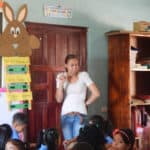
We are always looking for native English-speaking volunteers at Good Shepherd School. On the face of it, it is simply a great asset to have native English speakers in the classroom with the kids. To hear English spoken well and to converse goes such a long way towards helping our children achieve a bilingual competence. This will be of great asset to them, providing them with opportunities they would otherwise not have had. Still, Valentino and his mom show us that the value of their presence among us is so much more than simple linguistic competence. It’s really about making connections. Connections yield understanding. Understanding brings about just relationships. Just relationships secure peace. The children at Good Shepherd Bilingual School, Shoulder to Shoulder, and the people of Camasca are enriched for the presence of Jessica, Edman, Valentino, and Penelope. Thank you for making your home among us.
